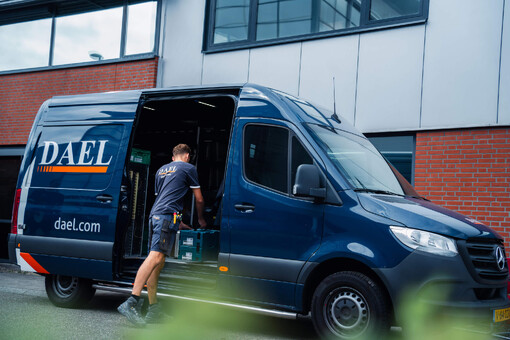CO2 results 2023
Tuesday 20 August 2024

The DAEL Group has the following main objective regarding CO2 reduction:
Before 2024, the DAEL Group will reduce its CO2 emissions by at least 30% compared to 2019.
To achieve this objective, a number of sub-objectives have been established. These are as follows:
- Before 2024, the DAEL Group aims to consume 16% less diesel per kilometer driven compared to 2019
- By 2024, the DAEL group aims to consume 14% less gasoline per kilometer driven compared to 2019
- Before 2024, the DAEL group aims to replace 10% of gasoline cars with Electric cars
- By 2024, the DAEL group wants 100% of electricity purchased to come from renewable sources
The 2023 emissions inventory results are shown below. The results are further specified under the heading 'notes'.





Explanation
The DAEL Group had set an ambitious target for 2024 to reduce total CO2 emissions by 30%, with this reduction being proportional to sales. This target reflects the DAEL Group's commitment to operate more sustainably and make a significant contribution to the environment.
We are therefore particularly proud to report that by 2023, the DAEL Group has made remarkable progress in this endeavor. Instead of the planned 30% reduction, the DAEL Group achieved an impressive reduction of no less than 52%. This exceptional performance far exceeds the original target and underscores the DAEL Group's commitment to reducing our impact on the environment.
This significant reduction in CO2 emissions is evidence of the effectiveness of the measures deployed and the DAEL Group's determination to make a positive impact. The success of 2023 not only provides a solid foundation, but also serves as inspiration for further sustainability in the future.
In addition, we had established sub-targets to further reduce emissions from our fleet. Our goal for 2024 was to replace 10% of passenger cars with electric vehicles. By the end of 2023, 36% of all passenger cars had already been electrified! We had also set ourselves the goal of purchasing only green electricity, which was ultimately achieved at 78%. The remaining 22% is due to the merger in 2022, where existing properties were added to the DAEL Group. For these properties, there were ongoing energy contracts that, due to the energy crisis, were not adjusted. Moreover, the addition of these properties caused our absolute gas consumption to increase.
Targets had also been set for gasoline and diesel consumption. Thanks to the efforts of our colleagues, the drivers of our fleet, we can proudly report that significant efforts have been made. Although the target for diesel consumption was originally a 16% reduction, the final reduction remained at 9%. For gasoline consumption, we had envisioned a 14% reduction, but consumption ended up remaining the same as in 2019. Nevertheless, there is a positive result: absolute gasoline consumption decreased by 34%, largely due to the electrification of our fleet. Despite not fully achieving the targets, we are grateful for the dedication and efforts of our drivers.
Scope 3
The pie chart below shows consumption in Scope 3, which includes emission flows from activities that take place up- and downstream of the DAEL Group office. Although the DAEL Group has limited influence over these, it strives to reduce emissions from Use-Of-Sold products through selling the PCM (see chain analysis).
The main sources of Scope 3 emissions for our company are:
Transport Downstream (42%):
- Emissions generated in the transportation of products to end users, account for 42% of our total Scope 3 emissions. We are working on more efficient logistics to reduce this impact.
Use of Sold Products (49%):
- Emissions resulting from customers' use of our products sold or installed, responsible for 49% of our Scope 3 emissions. We strive to improve the energy efficiency of our products and promote sustainable usage patterns.

